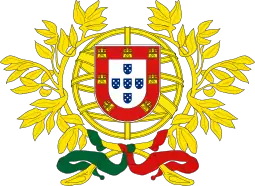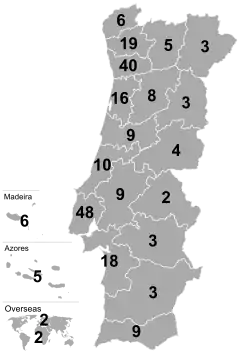Portuguese legislative elections
Since 1974, the year of the Carnation Revolution, fifteen legislative elections were held in Portugal.
 |
|---|
| This article is part of a series on the politics and government of Portugal |
| Constitution |
The parliament is usually elected to a four-year term, and currently (as of 2020) there are 230 Members of the Parliament, elected in Party's lists in 22 constituencies, corresponding to the 18 continental districts, 2 autonomous regions, one constituency for the Portuguese living abroad in Europe and the last one for the Portuguese living abroad in the rest of the world.
Each constituency elects a number of MPs proportional to its registered voters number, ranging from the 48 MPs in Lisbon to the 2 in Portalegre.
Electoral system
The Assembly of the Republic has 230 members elected to four-year terms. Governments do not require absolute majority support of the Assembly to hold office, as even if the number of opposers of government is larger than that of the supporters, the number of opposers still needs to be equal or greater than 116 (absolute majority) for both the Government's Programme to be rejected or for a motion of no confidence to be approved.[1]
The number of seats assigned to each district depends on the district magnitude.[2] The use of the d'Hondt method makes for a higher effective threshold than certain other allocation methods such as the Hare quota or Sainte-Laguë method, which are more generous to small parties.[3]
For the 2019 legislative elections, the MPs distributed by districts were as follows:[4]
| District | Number of MPs | Map |
|---|---|---|
| Lisbon | 48 |  |
| Porto | 40 | |
| Braga | 19 | |
| Setúbal | 18 | |
| Aveiro | 16 | |
| Leiria | 10 | |
| Coimbra, Faro and Santarém | 9 | |
| Viseu | 8 | |
| Madeira and Viana do Castelo | 6 | |
| Azores and Vila Real | 5 | |
| Castelo Branco | 4 | |
| Beja, Bragança, Évora and Guarda | 3 | |
| Portalegre, Europe and Outside Europe | 2 |
Election results 1976-2019
| Election | PCP | MDP | PS | PSD | CDS | UDP | APU | AD | FRS | PRD | CDU | PSN | BE | PAN | L | PàF | IL | CH | Oth | Inv | Turnout |
|---|---|---|---|---|---|---|---|---|---|---|---|---|---|---|---|---|---|---|---|---|---|
| 1976 | 14.4 | - | 34.9 | 24.4 | 16.0 | 1.7 | - | - | - | - | - | - | - | - | - | - | - | - | 3.9 | 4.7 | 83.5 |
| 1979 | - | - | 27.3 | 2.4 | 0.4 | 2.2 | 18.8 | 42.5 | - | - | - | - | - | - | - | - | - | - | 3.7 | 2.7 | 82.9 |
| 1980 | - | - | 1.1 | 2.5 | 0.2 | 1.4 | 16.8 | 44.9 | 26.7 | - | - | - | - | - | - | - | - | - | 4.1 | 2.3 | 83.9 |
| 1983 | - | - | 36.1 | 27.2 | 12.6 | 0.5 | 18.1 | - | - | - | - | - | - | - | - | - | - | - | 3.0 | 2.5 | 77.8 |
| 1985 | - | - | 20.8 | 29.9 | 10.0 | 1.3 | 15.5 | - | - | 17.9 | - | - | - | - | - | - | - | - | 2.1 | 2.5 | 74.2 |
| 1987 | - | 0.6 | 22.2 | 50.2 | 4.4 | 0.9 | - | - | - | 4.9 | 12.1 | - | - | - | - | - | - | - | 2.5 | 2.2 | 71.6 |
| 1991 | - | - | 29.1 | 50.6 | 4.4 | 0.1 | - | - | - | 0.6 | 8.8 | 1.7 | - | - | - | - | - | - | 2.8 | 1.9 | 67.8 |
| 1995 | - | - | 43.8 | 34.1 | 9.1 | 0.6 | - | - | - | - | 8.6 | 0.2 | - | - | - | - | - | - | 1.7 | 1.9 | 66.3 |
| 1999 | - | - | 44.1 | 32.3 | 8.3 | - | - | - | - | - | 9.0 | 0.2 | 2.4 | - | - | - | - | - | 1.7 | 2.0 | 61.1 |
| 2002 | - | - | 37.8 | 40.2 | 8.7 | - | - | - | - | - | 6.9 | 0.0 | 2.7 | - | - | - | - | - | 1.7 | 2.0 | 61.5 |
| 2005 | - | - | 45.0 | 28.8 | 7.2 | - | - | - | - | - | 7.5 | - | 6.4 | - | - | - | - | - | 2.2 | 2.9 | 64.3 |
| 2009 | - | - | 36.6 | 29.1 | 10.4 | - | - | - | - | - | 7.9 | - | 9.8 | - | - | - | - | - | 3.1 | 3.1 | 59.7 |
| 2011 | - | - | 28.1 | 38.7 | 11.4 | - | - | - | - | - | 7.9 | - | 5.2 | 1.0 | - | - | - | - | 3.4 | 4.1 | 58.0 |
| 2015 | - | - | 32.3 | 1.5 | 0.2 | - | - | - | - | - | 8.3 | - | 10.2 | 1.4 | 0.7 | 36.9 | - | - | 4.8 | 3.7 | 55.8 |
| 2019 | - | - | 36.4 | 27.8 | 4.2 | - | - | - | - | - | 6.3 | - | 9.5 | 3.3 | 1.1 | - | 1.3 | 1.3 | 3.9 | 4.9 | 48.6 |
| Oth: Other parties; Inv: Invalid/Blank votes. | |||||||||||||||||||||
| Source: Comissão Nacional de Eleições | |||||||||||||||||||||
List of Elections
- 1976 Portuguese legislative election
- 1979 Portuguese legislative election
- 1980 Portuguese legislative election
- 1983 Portuguese legislative election
- 1985 Portuguese legislative election
- 1987 Portuguese legislative election
- 1991 Portuguese legislative election
- 1995 Portuguese legislative election
- 1999 Portuguese legislative election
- 2002 Portuguese legislative election
- 2005 Portuguese legislative election
- 2009 Portuguese legislative election
- 2011 Portuguese legislative election
- 2015 Portuguese legislative election
- 2019 Portuguese legislative election
References
- "Constitution of the Portuguese Republic" (PDF). Archived from the original (PDF) on 2016-03-03. Retrieved 2019-12-29.
- "Effective threshold in electoral systems". Trinity College, Dublin. Retrieved 2015-10-21.
- Gallaher, Michael (1992). "Comparing Proportional Representation Electoral Systems: Quotas, Thresholds, Paradoxes and Majorities"
- "Mapa Oficial n.º 8/2019" (PDF). CNE - Comissão Nacional de Eleições - Diário da República, 1.a série—N.o 154-12 de agosto de 2019. Retrieved 30 April 2020.